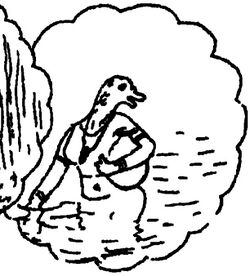Religion:Nganu Leima
| Nganu Leima | |
|---|---|
| Member of Lairembis | |
 Depiction of Nganu Leima | |
| Other names |
|
| Affiliation | Meitei mythology (Manipuri mythology) and Meitei religion (Sanamahism) |
| Animals | ducks and waterfowls |
| Symbols | ducks and waterfowls |
| Gender | Female |
| Region | Manipur, Northeast India |
| Ethnic group | Meitei ethnicity |
| Festivals | Lai Haraoba |
| Personal information | |
| Parents | Salailen (Soraren) |
| Siblings | Khunu Leima and Shapi Leima |
| Term | |
|---|---|
| English | Nganu Leima |
| Ancient Meitei | ꯉꯥꯅꯨ ꯂꯩꯃ (ngaa-noo lei-ma) |
| Modern Meitei | ꯉꯥꯅꯨꯔꯩꯃ (ngaa-noo-rei-ma) |
| Assamese | ঙানু লৈমা / ঙানুৰৈমা (ngaa-noo lei-ma / ngaa-noo-rei-ma) |
| Bengali | ঙানু লৈমা / ঙানুরৈমা (ngaa-noo lei-ma / ngaa-noo-rei-ma) |
| Hindi | ङानू लैमा / ङानु लैम (ngaa-noo lei-ma) |
| Sanamahism | |
Nganu Leima (/ngaa-noo lei-ma) or Nganureima (/ngaa-noo-rei-ma) is the goddess of ducks and other water birds in Meitei mythology and religion. She is a sister of goddesses Khunu Leima and Shapi Leima. Legend says that all three sisters married to the same mortal man.[1][2][3][4][5][6]
Etymology
The Meitei female given name "Nganu Leima" (ꯉꯥꯅꯨ ꯂꯩꯃ) is made up of two component words. The two words are "Nganu" (ꯉꯥꯅꯨ) and "Leima" (ꯂꯩꯃ). In Meitei, "Nganu" (ꯉꯥꯅꯨ) means duck.[7] The word "Leima" (ꯂꯩꯃ) is further made up of two component words, "Lei" (ꯂꯩ) and "Ma" (ꯃ). "Lei" (ꯂꯩ) means land or earth. "Ma" (ꯃ) means "mother". Literally, "Leima" (ꯂꯩꯃ) can be translated as "Land Mother" or "Mother Earth". But in general context, "Leima" (ꯂꯩꯃ) means a queen or a mistress or a lady.[8]
Description
Nganu Leima is described as the mistress of all the ducks and waterfowl of the world. At any moment, she could summon all the ducks and waterfowl at any place she wishes. She is one of the daughters of the sky god Salailen (alias Soraren).[9][5][10]
See also
- Ireima (Ereima), Meitei goddess of water
- Ngaleima, Meitei goddess of fish
References
- ↑ (in mni) Eben Mayogee Leipareng. 1995. pp. 107. https://archive.org/details/in.ernet.dli.2015.467071/page/n107/mode/2up.
- ↑ Folk Culture of Manipur - Page 7 - Moirangthem Kirti Singh · 1993
- ↑ (in mni) Tal Taret. 2006. pp. 39. https://archive.org/details/in.ernet.dli.2015.466201/page/n39/mode/2up.
- ↑ (in mni) Tal Taret. 2006. pp. 43. https://archive.org/details/in.ernet.dli.2015.466201/page/n43/mode/2up.
- ↑ Jump up to: 5.0 5.1 (in mni) Manipuri Phungawari. 2014. pp. 202. https://archive.org/details/dli.language.0065/page/n202/mode/2up.
- ↑ Regunathan, Sudhamahi (2005) (in en). Folk Tales of the North-East. Children's Book Trust. ISBN 978-81-7011-967-8. https://books.google.com/books?id=xfDNm96yCPIC&q=Nganu+Leima+goddess+ducks&pg=PA70.
- ↑ "Learners' Manipuri-English dictionary.Nganu". 2006. https://dsal.uchicago.edu/cgi-bin/app/sharma_query.py?qs=%EA%AF%89%EA%AF%A5%EA%AF%85%EA%AF%A8&searchhws=yes.
- ↑ "Learners' Manipuri-English dictionary.Leima". 2006. https://dsal.uchicago.edu/cgi-bin/app/sharma_query.py?qs=%EA%AF%82%EA%AF%A9%EA%AF%83%EA%AF%A5&searchhws=yes.
- ↑ (in mni) Tal Taret. 2006. pp. 46. https://archive.org/details/in.ernet.dli.2015.466201/page/n46/mode/2up.
- ↑ (in mni) Manipuri Phungawari. 2014. pp. 203. https://archive.org/details/dli.language.0065/page/n203/mode/2up.
Bibliography
- Glimpses of Manipuri Culture - Dr. Yumlembam Gopi Devi
- The History of Manipur: An early period - Wahengbam Ibohal Singh · 1986
External links
- "The Widow's Son :: Lukhrabi Macha Fungawari Singbul by B. Jayantakumar Sharma" (in en). http://www.e-pao.net/epSubPageSelector.asp?src=The_Widow_Son_Lukhrabi_Macha_By_Bidyarani_Thingujam&ch=manipur&sub1=Folks&sub2=Folk_Tales.
 |

